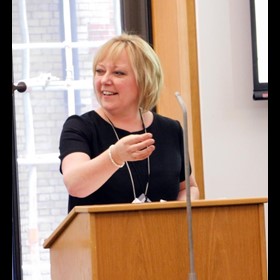FNP turns 10: Reflecting on the evolving FNP programme
Over the last 10 years I’ve worn a lot of different FNP hats – Family Nurse, Educator and, for the last four years, Supervisor – which perhaps means I’m well placed to reflect on what has been a fantastic journey.
I joined FNP as a Family Nurse in the very first group of sites for what I thought may be a short-term pilot project. As a team we weren’t sure what we were getting involved in but, from day one, we were encouraged to have open minds, be open to change and be curious. These attitudes have stood the test of time and are as relevant today as they were in 2007.
Looking back at those early days, my main reflections are that it was exciting, innovative and led nationally by inspirational people who I continue to have utmost respect for.
Positive changes over time
I’ve seen lots of changes to FNP over the years, but there are three that really stand out:
The learning programme
One of the most striking elements of FNP is the learning programme, which has always been of the highest quality, with many of the FNP community citing their learning experiences with the programme as the best they’ve ever had.
Since 2007, the learning programme has changed as we have learnt more about how to deliver the programme well – both locally and nationally – and what really helps our FNP clients in terms of clinical delivery. There have also been changes in the number of nurses joining the programme – and the professional backgrounds they’ve come from.
The use of data and research
The wealth of data available at team, nurse and client level is such a strength of FNP and really has grown and developed over time. 10 years ago, we completed paper forms, but now, with remote technologies, nurses can complete data forms with clients in their own homes.
The ‘real time’ information system is very much a live reflection of what is happening every day in practice which gives us the ability to use data to inform both clinical delivery and strategic decisions and commissioning. In my experience, this is a unique position.
The FNP programme methods and materials
The materials used today are very different to the black and white US resources we had in 2007: they are informed by new evidence, colourful and engaging. And we’re able to supplement these materials with a host of additional resources like games and apps.
Our methods continue to be rooted in the original spirit of FNP but have benefitted from years of testing and client feedback, and taking more and more from the field of motivational interviewing. The communication approach and the skills I see in nurses in 2017 is one of the biggest and most significant areas of change in clinical practice in my opinion. It is this approach that ensures the engagement and therapeutic relationships with clients which is so important.
My continuing passion for FNP
What’s really special about FNP is that it brings together evidence-based tools and methods, real-time data and a structured intensive home visiting programme and has an intense focus on delivering good outcomes for clients.
I remain incredibley passionate about FNP – and for the same reasons that drew me in as Family Nurse back in 2007:
- The evidence base and openness to learn from research – being able to work in such a well evidenced programme that is evolving and responding to evidence is a gift.
- It links theory with practice – the core aspects of the programme are played out in every visit.
- Working with a licensed programme with quality methods and materials is very satisfying and fulfilling – both in my role as a Supervisor, working with my amazing team, but also in my clinical work with families.
- FNP is about relationships and that is what makes it special.Being relational is special to me but also to the clients, the FNP teams and the colleagues and friends of FNP.
- Making a difference – this programme makes a difference now and into the future: the evidence about early intervention is clear, the evidence about FNP is clear and the client stories are clear.
Lot of things have changed in 10 years, but the important principles and attitudes of FNP – high quality nursing practise, long-term relationships, listening to clients and building on their strengths, following the evidence, being curious, asking questions and embracing change – are present today and will serve us well as we move into the future, retaining what is best about FNP and embracing what will be new.
By Nicki Jeffries, FNP Supervisor, Buckinghamshire
